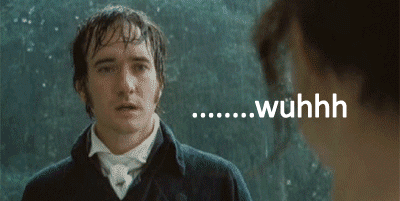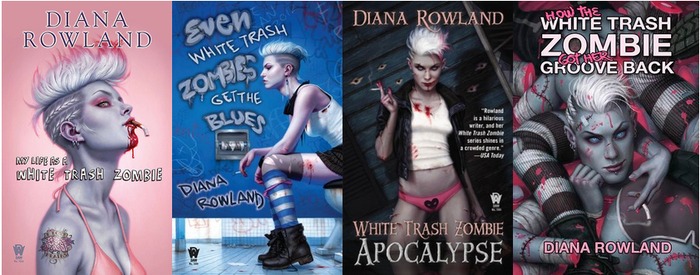Sci-Fi Month is hosted by Rinn @ Rinn Reads, and this year I'm participating!
Retellings aren't new. We've been retelling stories for centuries - every country seems to have a different ending to some of the world's most famous fairy tales, like Little Red Cap - and it's only in recent years that retellings have taken the publishing world by storm, from Fables to The Lunar Chronicles.
Of course, fairy tales aren't the only stories to find themselves being given a fresh lick of paint; our classics keep getting retold, too, and Jane Austen's work is no stranger to these reworkings. Persuasion has been reimagined in outer space in Diana Peterfreund's For Darkness Shows the Stars, and Jo Baker has told Pride and Prejudice from the point of view of the servants in her most recent novel, Longbourn.
In 2009, Seth Grahame-Smith released his own reworking of the story in Pride and Prejudice and Zombies, and next year it will be hitting the big screen with Lily James of Downton Abbey and Cinderella fame in the starring role.
Grahame-Smith isn't the only author to have added one of our most gory supernatural creatures to a classic. Only a year later, in 2010, Isaac Marion's Warm Bodies was published; a zombie story heavily influenced by William Shakespeare's Romeo and Juliet. This, too, was adapted, in 2013.
Here we have two of the most famous love stories in the history of literature, both with added zombies. But why?
I suppose the first thing we should consider is this: Are these stories actually retellings or not?
Not only does Pride and Prejudice and Zombies still have the original title in the title, but it's even credited as being written by Seth Grahame-Smith and Jane Austen. It's almost as though Grahame-Smith is using Austen's name to imply that she'd totally approve of what he's done with her characters (and hey, she might!), and perhaps that's what's most important here - has Grahame-Smith written a retelling, or has he simply borrowed Austen's characters to write a bizarre piece of fanfiction? Jane Austen Zombie AU.
Usually, retellings add a little something to the original tale. For example, at first glance Marissa Meyer's Cinder might not have anything to do with the original fairy tale, but she's managed to do a lot with her series; she's included so much diversity, from people of colour to amputees, and she's managed to give her Cinderella a little more agency than the original. People are reading fairy tales differently all the time, and I quite like the argument that Cinderella isn't as weak as we might first think because, by going to the ball, she does go after the Prince for herself, but Cinder is so much easier for us to relate to. We can accept how Cinderella might have ended up her stepmother's servant in the original tale, but in a retelling we need a little more proof that a person could ever be treated in such a way, and by making Cinder a cyborg, and therefore a second-class citizen, Meyer does just that.
But what do zombies add to the original Pride and Prejudice tale?
In Longbourn, Jo Baker reminds us that the Bennet family had servants, and those servants had dreams and fears of their own. It's easy to forget that servants are present throughout all six of Austen's novels - Darcy's horse won't saddle itself, and we can be certain Emma never has to worry about her laundry - and by giving them a story Baker reminds us of the historical context of Austen's stories.
Director Gurinder Chadha, most famous for Bend It Like Beckham (starring a young Keira Knightley who, funnily enough, played Elizabeth Bennet in 2005), gave Pride and Prejudice a Bollywood-style makeover in her 2004 film, Bride and Prejudice. Showing the similarities between British high society in Austen's day and Indian culture helps us to fully understand and appreciate just how vital a good marriage is to the Bennet sisters, and also adds some racial diversity to Austen's white, upper class tale.
And zombies... eh?
Similarly, is Warm Bodies really a retelling? At least Pride and Prejudice and Zombies keeps the original characters (to an extent), but the characters in Warm Bodies aren't even called Romeo and Juliet - not that R and Julie are all that far away.
To me, though, Warm Bodies gives a little more life to Romeo by making him a member of the undead. Juliet is a fascinating character. In the original play she has some amazing, violent monologues - in fact Romeo's more of a romantic than she is. Even when she's thinking fondly of Romeo, Juliet thinks of cutting 'him out into little stars and he shall make the face of heaven so fine that all the world will be in love with night and pay no worship to the garish sun.' She's definitely much more interesting than Romeo is.
Julie in Warm Bodies is just as interesting, but R is an equally intriguing character. How often do we get zombie stories from the point of view of the zombies? Throughout the story there are little tributes to the play; there's the famous balcony scene, and Julie's best friend, Nora, wants to be a nurse. Plus the whole idea of Julie literally bringing R back to life is a clever little tip of the hat to Romeo, who is certain he's never going to get over Rosaline until he sets his eyes on Juliet.
With all that in mind, perhaps Warm Bodies is more of a homage to Romeo and Juliet than a retelling of it.
Most importantly of all, does any of this matter? Does it really matter whether or not I think these stories are retellings or not? After all, perhaps by introducing the undead to these narratives they've, ironically, been brought to life for people who might never have gone anywhere near the original stories. Of course, that still doesn't mean they are going to go anywhere near the originals - how many people, upon finishing Warm Bodies, decided to go and read Romeo and Juliet? Probably not that many. How many Austen fans enjoyed Pride and Prejudice and Zombies? Again, I don't think that many Austen lovers did, whereas people who weren't already lovers of Austen's work thought it was clever.
So whose opinion is more valid? Do we rely on the feedback of the book purists, or do we ignore them in favour of this new audience because, let's face it, the new audience is one of the big reasons for retelling such a famous story in the first place?
Personally, I think Warm Bodies is quite a clever reworking of probably the most famous love story of all time. Even people who've never gone anywhere near Shakespeare can quote from Romeo and Juliet, which just goes to show how influential the text is. I've always read Romeo and Juliet as a story about what hate can do rather than a love story; this family's feud, so old they can't even remember how it started, brings about the death of several young people, including their own children.
Adding zombies to such an iconic story might sound ridiculous at first - though I'm sure plenty of people told Baz Luhrmann that setting the story in '90s America would be a mistake at first - but stories continually change depending on their context. At the start of Sci-Fi Month I mentioned how one of the things I love about sci-fi is how we can see how a society's feeling depending on the way it writes its sci-fi; over the past thirty years we've gone from writing about hoverboards to post-apocalyptic wastelands. We currently live in a time where young people are looking at the future and finding it to be bleaker than they'd like, and our sci-fi reflects that. Warm Bodies is Romeo and Juliet for today's audience. It's bleak, and yet it's also so incredibly hopeful. In some ways it does the complete opposite of the original text by starting out hopeless and working its way towards a brighter future.
Pride and Prejudice, on the other hand, doesn't need that reworking. At least not in my opinion. What bothers me about Pride and Prejudice and Zombies - as much as I think it's a fun idea, and, ultimately, I do think it's only meant to be a bit of fun - is that it's trying to give us a 'kick-ass' Elizabeth Bennet. The only problem? Elizabeth Bennet's already kick-ass. I fear that Pride and Prejudice and Zombies is going to fall into the trap of suggesting women can only be brilliant heroines when they're also capable of punching your lights out.
Now for all I know this isn't the case at all. I haven't read the book and the film isn't out yet - and I must admit, I do love that brief scene in the trailer of the Bennet sisters hiding daggers beneath their skirts - but it does feel as though Grahame-Smith has tried to update Pride and Prejudice when it doesn't really need updating. Elizabeth and her sisters - and Charlotte Lucas, too - are still perfectly relatable characters. Do we wish Elizabeth would give George Wickham a huge wedgie? Yes, of course, but just because she doesn't do that doesn't make her a character in need of updating.
Warm Bodies works because Romeo's a bit of a sap, he seems to exist just so Juliet can fall in love with him; Juliet's journey is less about true love and more about escaping from a home she hates, with a mother she's not particularly close to and a father who's willing to marry her off to a man she hasn't chosen herself. Romeo could have been anyone, but if you're going to run away from home and elope so that no man of your father's choosing will ever want you, you might as well make it to a man who thinks the sun shines out of your backside. But we don't need to add zombies to Austen to make her sexual and marital politics interesting, because they already are; by the end of the novel (I'm not going to class this as a spoiler because, well, Pride and Prejudice has been around for, like, 200 years) Elizabeth, Jane, Charlotte and Lydia are all married, and all under completely different circumstances. With each marriage Austen tells us something different, and I'm really struggling to see what zombies can do for it.
I do think Pride and Prejudice and Zombies is fun and I'm looking forward to seeing it - I know I probably come across as such a grumpy old lady in this post - but as an English graduate I just can't help thinking critically about reworkings like these.
What do you think?






















